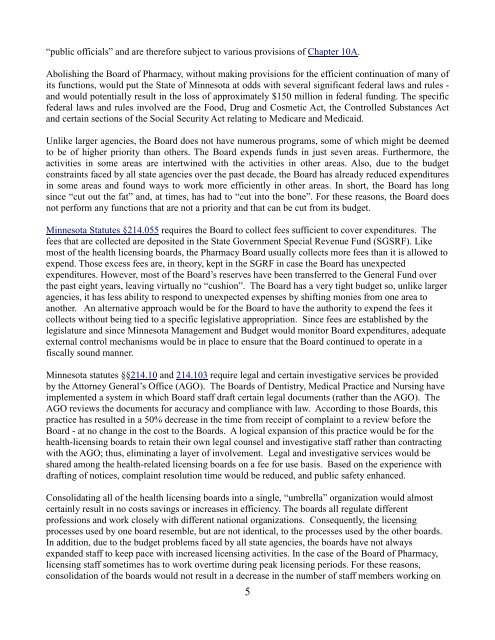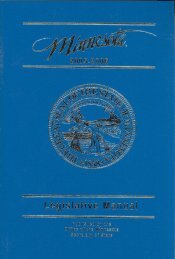Minnesota Board of Pharmacy - Minnesota State Legislature
Minnesota Board of Pharmacy - Minnesota State Legislature
Minnesota Board of Pharmacy - Minnesota State Legislature
You also want an ePaper? Increase the reach of your titles
YUMPU automatically turns print PDFs into web optimized ePapers that Google loves.
“public <strong>of</strong>ficials” and are therefore subject to various provisions <strong>of</strong> Chapter 10A.<br />
Abolishing the <strong>Board</strong> <strong>of</strong> <strong>Pharmacy</strong>, without making provisions for the efficient continuation <strong>of</strong> many <strong>of</strong><br />
its functions, would put the <strong>State</strong> <strong>of</strong> <strong>Minnesota</strong> at odds with several significant federal laws and rules -<br />
and would potentially result in the loss <strong>of</strong> approximately $150 million in federal funding. The specific<br />
federal laws and rules involved are the Food, Drug and Cosmetic Act, the Controlled Substances Act<br />
and certain sections <strong>of</strong> the Social Security Act relating to Medicare and Medicaid.<br />
Unlike larger agencies, the <strong>Board</strong> does not have numerous programs, some <strong>of</strong> which might be deemed<br />
to be <strong>of</strong> higher priority than others. The <strong>Board</strong> expends funds in just seven areas. Furthermore, the<br />
activities in some areas are intertwined with the activities in other areas. Also, due to the budget<br />
constraints faced by all state agencies over the past decade, the <strong>Board</strong> has already reduced expenditures<br />
in some areas and found ways to work more efficiently in other areas. In short, the <strong>Board</strong> has long<br />
since “cut out the fat” and, at times, has had to “cut into the bone”. For these reasons, the <strong>Board</strong> does<br />
not perform any functions that are not a priority and that can be cut from its budget.<br />
<strong>Minnesota</strong> Statutes §214.055 requires the <strong>Board</strong> to collect fees sufficient to cover expenditures. The<br />
fees that are collected are deposited in the <strong>State</strong> Government Special Revenue Fund (SGSRF). Like<br />
most <strong>of</strong> the health licensing boards, the <strong>Pharmacy</strong> <strong>Board</strong> usually collects more fees than it is allowed to<br />
expend. Those excess fees are, in theory, kept in the SGRF in case the <strong>Board</strong> has unexpected<br />
expenditures. However, most <strong>of</strong> the <strong>Board</strong>’s reserves have been transferred to the General Fund over<br />
the past eight years, leaving virtually no “cushion”. The <strong>Board</strong> has a very tight budget so, unlike larger<br />
agencies, it has less ability to respond to unexpected expenses by shifting monies from one area to<br />
another. An alternative approach would be for the <strong>Board</strong> to have the authority to expend the fees it<br />
collects without being tied to a specific legislative appropriation. Since fees are established by the<br />
legislature and since <strong>Minnesota</strong> Management and Budget would monitor <strong>Board</strong> expenditures, adequate<br />
external control mechanisms would be in place to ensure that the <strong>Board</strong> continued to operate in a<br />
fiscally sound manner.<br />
<strong>Minnesota</strong> statutes §§214.10 and 214.103 require legal and certain investigative services be provided<br />
by the Attorney General’s Office (AGO). The <strong>Board</strong>s <strong>of</strong> Dentistry, Medical Practice and Nursing have<br />
implemented a system in which <strong>Board</strong> staff draft certain legal documents (rather than the AGO). The<br />
AGO reviews the documents for accuracy and compliance with law. According to those <strong>Board</strong>s, this<br />
practice has resulted in a 50% decrease in the time from receipt <strong>of</strong> complaint to a review before the<br />
<strong>Board</strong> - at no change in the cost to the <strong>Board</strong>s. A logical expansion <strong>of</strong> this practice would be for the<br />
health-licensing boards to retain their own legal counsel and investigative staff rather than contracting<br />
with the AGO; thus, eliminating a layer <strong>of</strong> involvement. Legal and investigative services would be<br />
shared among the health-related licensing boards on a fee for use basis. Based on the experience with<br />
drafting <strong>of</strong> notices, complaint resolution time would be reduced, and public safety enhanced.<br />
Consolidating all <strong>of</strong> the health licensing boards into a single, “umbrella” organization would almost<br />
certainly result in no costs savings or increases in efficiency. The boards all regulate different<br />
pr<strong>of</strong>essions and work closely with different national organizations. Consequently, the licensing<br />
processes used by one board resemble, but are not identical, to the processes used by the other boards.<br />
In addition, due to the budget problems faced by all state agencies, the boards have not always<br />
expanded staff to keep pace with increased licensing activities. In the case <strong>of</strong> the <strong>Board</strong> <strong>of</strong> <strong>Pharmacy</strong>,<br />
licensing staff sometimes has to work overtime during peak licensing periods. For these reasons,<br />
consolidation <strong>of</strong> the boards would not result in a decrease in the number <strong>of</strong> staff members working on<br />
5

















